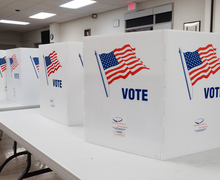After 25 years, Friends of Dorothy House keeps doors open to guests with HIV/AIDS
Kai Nguyen | Staff Photgrapher
Michael DeSalvo has been running the Friends of Dorothy House with his partner, Nick Orth, for 25 years this October.
A navy and yellow house filled with soul quietly sits in Syracuse. Two large wooden French doors act as its gateway. Homeowner Michael DeSalvo descends the central rustic staircase with a warm smile, opening the doors to reveal a memorial wall with 42 nameplates on it. The air feels heavy, but the mood is light. The home is blind to people’s history, and once inside, it embraces their future.
DeSalvo and his partner, Nick Orth, opened this house, their home, in October 1992 to people dying of HIV/AIDS. That year, AIDS-related deaths peaked at a rate of 11 per 100 person-years, according to POZ, a news source for people affected by HIV/AIDS. Twenty-five years later, the Friends of Dorothy House continues to welcome guests with nowhere else to turn.
“A lot of great spirits have walked in and out of here — to die and to live,” DeSalvo said.

The name plates represent those who died after care from Friends of Dorothy.
Kai Nguyen | Staff Photographer
At the start of the AIDS crisis in the 1980s, the disease wasn’t fully understood. Many guests flowed in and out of the Friends of Dorothy House, rejected by their families, employers and society. One guest, DeSalvo said, went to a hospital for care and would receive food after it was left outside the room because no one wanted to get too close.
“People came so broken in the early years,” DeSalvo said. “This has always been the place for people falling through the cracks.”
For more than 25 years, the house welcomed countless guests, friends, loved ones and strangers. No guest is ever charged for their stay, and in some cases they receive financial support from DeSalvo and Orth.
But Friends of Dorothy isn’t just welcoming to guests. It gives equal care and attention to its guests’ loved ones. Terry Visconti, 60, grew close to DeSalvo and Orth after frequently visiting her friend Michael, who stayed and died at the house 10 years ago.
“The house is always very warm and has a loving atmosphere,” Visconti said. “They welcome everybody and everyone.”
After Michael died, Visconti kept her relationship with Friends of Dorothy strong and volunteered for 10 years at the house’s monthly dinners, which sometimes serve up to 300 people.
“The dinners are a gathering of many people and different walks of life and just a social atmosphere,” Visconti said.
DeSalvo and Orth’s monthly dinners are the house’s main fundraiser and community building event.
Gretchen Purser, an assistant professor of sociology in the Maxwell School of Citizenship and Public Affairs at Syracuse University, has attended several Friends of Dorothy dinners.

Michael DeSalvo in front of his house that has been open to guests with HIV/AIDS since October of 1992.
Kai Nguyen | Staff Photographer
“Their fundraising strategy itself is a huge asset to the community, and that’s so cool that they figured out how to do the fundraising they need in a way that also builds community. I think that’s really special,” Purser said.
In the years since Friends of Dorothy’s doors opened, HIV/AIDS has seen societal, cultural, legislative and medical breakthroughs. There is more access to antiretroviral therapies that slow the rate of HIV in the body, preventative drugs like PrEP and PEP, and comprehensive sexual education, according to United States Department of Health and Human Services. In 2016, AIDS-related deaths decreased by 48 percent since 2005, per the United Nation.
Many people affected by HIV/AIDS are living normative life spans, but still, too many are becoming infected, said Andrew London, associate dean for finance and administration in the Maxwell School of Citizenship and Public Affairs and a professor of sociology. London said medical treatments are effective at prolonging life, but he added there is a need for better comprehensive sexual health education.
“I worry that there is no magic bullet … even with PrEP, HIV infections will still happen,” he said in an email. “Good sexual health is attainable. I hope I live long enough to see it happen in the U.S.”
Visconti said as time has passed she’s seen a shift in society’s perception of HIV/AIDS.
“It’s not so taboo like it used to be,” she said. “I don’t think people are so apt to make judgments, and people were more afraid back then that it was more contagious, and I don’t think that’s the case anymore.”
Nevertheless, DeSalvo and Orth, a gay self-identified Catholic couple, said they receive mixed reactions in the community.
“It has been a very lonely journey because gay people didn’t get us, the Christians didn’t get us, which put us in a very autonomous place,” DeSalvo said.
This didn’t deter their passion for hospitality. Since Friends of Dorothy is a nonprofit, the couple relies on donations from the community, but it has never been about the money for them. Their love and faith in the work they do make the pain and loss worth it.

The Friends of Dorothy House was first opened by homeowners Michael DeSalvo and Nick Orth to support those dying of HIV/AIDS.
Kai Nguyen | Staff Photographer
“The things people would tell us that was going on in their lives, then coming here with the love and care, that’s why they lived longer,” DeSalvo said.
And people are living longer. There hasn’t been a death in Friends of Dorothy for some time, which gives DeSalvo and Orth the opportunity to work on more social justice issues.
“I think that even though people are living, it doesn’t mean they don’t need care. We have a crisis of care in general,” Purser said.
In Syracuse, a crisis of care can be seen in terms of the poor, the homeless, the elderly and undocumented immigrants, Purser said. As activists, DeSalvo and Orth constantly raise awareness of HIV/AIDS, but more broadly, continue to fight for dominant social issues in a local setting.
At the moment, only one guest is staying at the house. DeSalvo and Orth work with the Infectious Disease Clinic at State University of New York Upstate Medical University and remain on the forefront of HIV/AIDS support in Syracuse.
The clinic made the couple aware of a patient who didn’t have insurance and was facing a massive financial copay. Friends of Dorothy paid it off without ever meeting the individual. For DeSalvo and Orth, people outside the organization are equally important as the guests inside.
“It’s not about the numbers coming in the door. What is important is working on quality of life with people living outside our doors,” DeSalvo said.
October 2017 looks very different than October 1992 for DeSalvo and Orth, but some issues remain the same. After 25 years, inequality and racism in the country are still prevalent issues the couple continues to fight for. Today, Friends of Dorothy’s French doors are open to all.
“It’s never been about our convenience as much as it is about responding and reacting to what is going on around us,” DeSalvo said.
Published on October 10, 2017 at 10:45 pm
Contact Myelle: malansat@syr.edu





